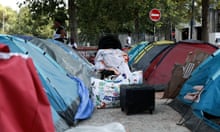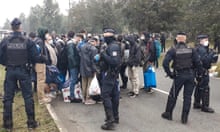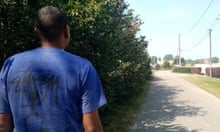These are people in Calais now. People who wanted to find new lives. Instead they lie like cocooned caterpillars, desperately hoping to wake up to a different world. Others sit on the rubbish-strewn pavement, hunched in blankets. They too are rubbish, or so it would seem, according to widespread attitudes that have in recent weeks seen calls for children to undergo dental inspections to determine their age. How old are the people huddled here in the heart’s cold dawn – children, adolescents or adults? Can we at least agree they are fellow human beings?
I would harrow you, I would harrow myself. Give me words to make this picture real. If we could feel the pain of others, we would be good people, you and I. But this is an age of unparalleled harshness. Pictures of suffering pass us by. We narrow our eyes and close our souls. What have we become?
Let’s look, at least. It seems to be early morning. Remember a time you greeted the dawn after a club, or waiting for a Greek ferry. But this is different. There’s no bed to go to and no destination in sight. A camp that provided some kind of desperate community is being demolished. The people here are falling into a gap in the modern world. They look like they are bound for a homeless future. These are the people we have decided we have no space for, no interest in and no compassion towards. This is the result – people mingling with discarded plastic bottles in the streets of abandonment. For human beings don’t disappear, unless you actually kill them. They stand around, slump in blankets, lie wrapped up and trying to dream of somewhere better. Here they are – the unwanted.
We have no Statue of Liberty, of course. There is no poem of welcome and generosity engraved on the white cliffs of Dover to shame our failure of imagination with the words put up in New York harbour in 1903: “Give me your tired, your poor, Your huddled masses yearning to breathe free, The wretched refuse of your teeming shore.”
It is hard to think of an image that more perfectly expresses the migrant condition – as Emma Lazarus acutely summed it up in the poem she wrote for the Statue of Liberty – than this. For it is, precisely, a photograph of people reduced to the state of “wretched refuse”. Only there is no harbour welcoming them.
In the 1900s it was the unwanted minorities of Europe and its eastern periphery who fled to the Statue of Liberty’s (comparatively) welcoming light. In the Royal Academy’s great exhibition Abstract Expressionism you can see what migrants are capable of. People are crowding Burlington House to admire the prickly, dream-haunted paintings of Arshile Gorky, who was born Armenian near Lake Van, survived Turkey’s hunger marches in which his mother died, became an American and helped give US art its finest hour. They contemplate too the painfully beautiful paintings of Mark Rothko, born Markus Yakovlevich Rotkovich in Dvinsk in 1903, who arrived at Ellis Island in 1913 and became one of the greatest Americans.
This exhibition in London now, while the Calais camp is burning and people I won’t dignify by calling them fascists are making money and getting power by whipping up a spurious fear of people whose vulnerability this picture makes plain, shows what migrants can do for a country. For all anybody knows the young people in this photograph could include the Gorky and Rothko of the 21st century. And by god we need them. But our stupid age dismisses the human potential of millions. Angela Merkel, instead of being praised for an act of humanity that is so clearly an act of German redemption, is reviled for “letting in these people” or whatever words are being used today to kill the least stirring of compassion.
If history has taught us one thing it is that fear of the other is always irrational. There is no case in history when a wave of hatred was justified or grounded in fact. Yet such waves of fear and loathing can be so forceful and widespread that they appear completely sane to those affected, and are hard to resist. There was no rational basis for the antisemitism that made Rothko’s family flee Russia. Labour MPs who think the left needs to accept the current anti-migrant mood are utterly wrong because such moods can and do thrive independently of fact. Here’s the question: should liberals and socialists in the 1930s have recognised there were legitimate reasons for popular antisemitism?
So look, and weep. Not for them. For us.










